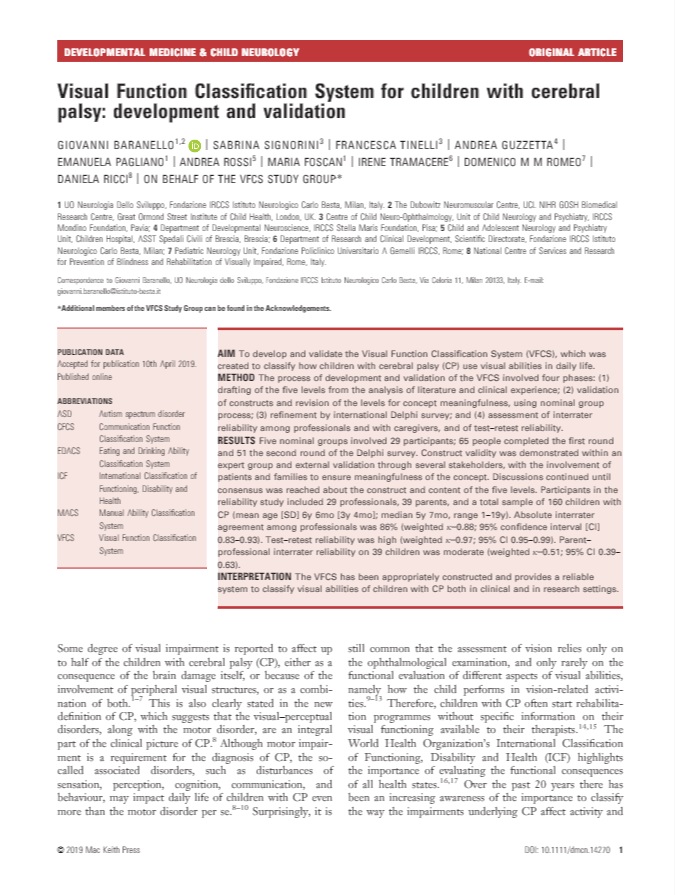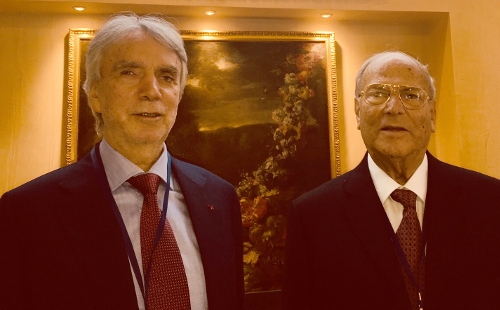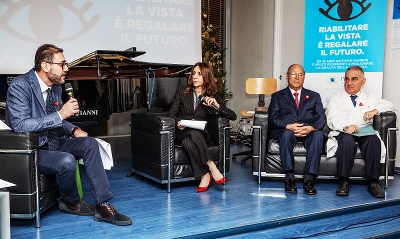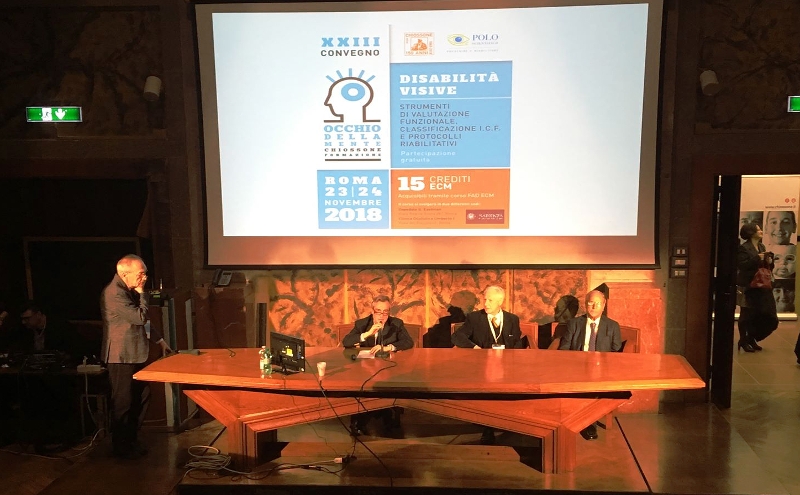Gli esperti del Polo Nazionale di Servizi e Ricerca per la Prevenzione della Cecità e la Riabilitazione Visiva degli Ipovedenti hanno confrontato due metodi per la valutazione del campo visivo: il test di Esterman e quello di Custom CV%, i cui esiti sono infine risultati sovrapponibili.
Libro bianco sulla riabilitazione visiva in Italia
In questo volume, a cura degli oculisti S. Turco e F. Amore, si parla di riabilitazione visiva nel nostro Paese. Si va dagli aspetti epidemiologici a quelli normativi e si fa il punto sui Centri per gli ipovedenti esistenti in Italia. Il lavoro, pubblicato nel 2015 come supplemento a “Oftalmologia Sociale”, è stato curato dal Polo Nazionale di Servizi e Ricerca per la Prevenzione della Cecità e la Riabilitazione Visiva degli Ipovedenti, Centro di Collaborazione OMS fondato dalla IAPB Italia onlus.
Standard internazionali in riabilitazione visiva
Questo documento – disponibile in versione inglese – è il risultato di un processo di consultazione finalizzato a elaborare standard internazionali per la riabilitazione visiva. Il processo, cominciato nel 2014, è culminato nell’International Consensus Conference on Vision Rehabilitation che si è svolta dal 12 al 15 dicembre 2015 grazie a un intenso rapporto di collaborazione tra la IAPB Italia, l’OMS e il Polo Nazionale per la Riabilitazione Visiva di Roma.
Depressione maculare legata all’età e depressione
Tra degenerazione maculare legata all’età (AMD o DMLE) e depressione esiste un nesso in parte inesplorato. In quest’articolo scientifico, firmato da tre specialiste del Polo Nazionale per la Riabilitazione Visiva – S. Fortini, E. Rellini e S. Turco -, sono contenuti i dati di un studio preliminare condotto su 173 persone colpite da DMLE.
Riabilitazione visiva con la Stargardt
Il Polo Nazionale e la Clinica oculistica del Gemelli hanno effettuato un’accurata analisi della retina degli ipovedenti, studiando accuratamente anche le loro capacità di lettura. Leggi l’articolo originale in inglese…
European Journal of Ophthalmology
Ilaria Di Maggio, Gianni Virgili, Giovanni Giacomelli, Vittoria Murro, Giovanni Sato, Filippo Amore, Gianfrancesco Maria Villani, Stefania Fortini, Simona Turco, Alfredo Pece, Roberta Rizzo, Alessandro Galan, Lucia Giordani, Dario Pasquale Mucciolo, Laura Nota (2019), “The Veterans Affairs Low-Vision Visual Functioning Questionnaire-48 (VA LV VFQ-48): Performance of the Italian version”, European Journal of Ophthalmology, doi: 10.1177/1120672119852016
Developmental Medicine & Child Neurology
Giovanni Baranello, Sabrina Signorini, Francesca Tinelli, Andrea Guzzetta, Emanuela Pagliano, Andrea Rossi, Maria Foscan, Irene Tramacere, Domenico M M Romeo, Daniela Ricci, VFCS Study Group, From neuroplasticity to neurostimulation, including vision rehabilitation at home and the progress of patients who have received a retinal prosthesis implant (the so-called “bionic eye” or, more accurately, the artificial retina). These are the main topics that were addressed during the Symposium of the National Centre – it took place in Rome on 29th November, 2018 – as part of the 98th Congress of the Italian Society of Ophthalmology. [[From 28th November to 1st December, 2018. The 150th anniversary of SOI will be celebrated in 2019.]] The International Agency for the Prevention of Blindness-IAPB Italy also hosted its own conference, a symposium concerning the appearance of the visually impaired: prosthetic strategy and surgery (eye socket, plastic surgery and diseases of the ocular adnexa). We discussed the prescription of ocular prosthesis as well as the psychological aspects of aesthetic damage at ocular level. The President of IAPB Italy, Mr. Giuseppe Castronovo, opened the proceedings, starting from his own experience and stated that “ocular prostheses are crucial, also for a person’s social life”. He was followed by the Vice President, Mr. Michele Corcio, who briefly outlined the history of the blind and said that “in the ’70s and’ 80s the need was felt to publicly show blindness” in a period of political, social and cultural protest. This time of “realism” with regard to disability (that is to say, showing it in an unfiltered way), was followed by a “period of concealment of blindness” (when dark glasses were worn even indoors). Yet, Corcio observed: There is a middle way between a “raw” and “violent” exposure of blindness and its concealment. The ocular prosthesis is important: we must neither hide nor exhibit our disability, but be ourselves. Dr. Stefania Fortini, psychologist and Deputy Director of the National Centre highlighted that… the psychological aspect considerably affects social acceptance and, therefore, quality of life. […] We must never fail to evaluate the physical and emotional well-being of patients, in order to determine the ones who need further support. At the end of her speech, Dr. Fortini said that “ophthalmologists are not fully aware of the physical and emotional problems faced by patients who are suffering from ocular aesthetic damage”. Within the broad framework of the SOI congress – mainly geared towards ophthalmologists and other professionals in the sector – not only conferences, but also workshops, verbal communications and posters were featured. Traditional themes of ophthalmology were addressed, along with cutting edge innovative themes. It was also possible to watch a live surgery, as usual. Read the SOI Program (98th National Congress) Reference source: SOI On Thursday 13th December 2018 we celebrated the 10th anniversary of the National Centre of Services and Research for the Prevention of Blindness and Vision Rehabilitation of the Visually Impaired, with personal stories shared by its protagonists: from ophthalmologists to visually impaired people. It was a day of celebration: many stories and personal life experiences were shared by people of all ages, from children to the elderly, in the presence of their families. The various events of the day – which were moderated by the journalist Nicoletta Carbone of the Italian Radio 24, and were assisted by Dr. Filippo Amore – started at 10 a.m: after a brief presentation, there was also a welcoming speech by Mr. Giuseppe Castronovo, President of IAPB Italy, founder and current President of the National Centre. The National Centre is a wonderful initiative, which is crucial for vision rehabilitation and blindness prevention. We don’t want anybody to become blind: neither children, nor adults or elderly people. Among the day’s speakers were Ms. Giuseppina Rizzo (from the Ministry of Health), Prof. Emilio Balestrazzi, former Director of the Ophthalmology Clinic of Gemelli Hospital, as well as its current Director, Prof. Aldo Caporossi. The international relevance of the National Centre – as unique WHO Collaborating centre for vision rehabilitation since 2013 – and vision rehabilitation of children were outlined thanks to the presentations by the Director of the National Centre, Dr. Filippo Amore, the ophthalmologist Dr. Romina Fasciani (Gemelli Hospital)and Prof. Eugenio Mercuri (Director of the Child Neuropsychiatry Department of the Gemelli Hospital). The first day was dedicated, in particular, to neuro-ophthalmological issues in children and adults (including brain plasticity), while presentations on the second day focused more on technical-rehabilitative aspects, and on the protocols (rehabilitation procedures) and the assessment of vision disabilities. The experts who were invited to speak hailed from numerous institutions, such as the A. Gemelli Polyclinic Hospital in Rome, the National Centre for Vision Rehabilitation, the Sapienza University of Rome, the David Chiossone Institute in Genoa, the Gaslini Hospital, the World Health Organization, the Pavia Eye Clinic, etc. Mr. Giuseppe Castronovo, President of IAPB Italy, opened the event on 23rd November, together with Prof. F. Cruciani, Prof. A. Lambiase (Sapienza University) and the President of the Chiossone Institute, Prof. C. Cassinelli. In his speech, Mr. Castronovo said: Sight and rehabilitation are two wonderful words. Sight gives us freedom and autonomy: we must do everything we can to avoid young people, adults and the elderly losing it. In a subsequent working session, Dr. Simona Turco – an ophthalmologist who works at the National Centre founded by IAPB Italy at the A. Gemelli Polyclinic Hospital – presented a home-based vision rehabilitation program (Eye Fitness) that was developed by the National Centre, which uses an innovative IT platform. On 24th November, the case studies of a number of adults and visually impaired children who had followed a vision rehabilitation path, in particular at the National Centre, were also presented at the Aula Magna of the Ophthalmology Clinic of the Sapienza University. The training course was free of charge and catered primarily to doctors and orthoptists [Participants were awarded 15 CME credits]. It was organized by the Chiossone Institute – its 150th anniversary is celebrated this year – in collaboration with the National Centre.Vision rehabilitation presented at SOI congress
On November 29th, 2018 two symposia of the National Centre and IAPB Italy have been held at the 98th Congress of the Italian Society of Ophthalmology


 It was an opportunity for discussion and further training on major themes, such as cataracts, the cornea and the ocular surface, eye tumors, glaucoma, uveitis, neuro-ophthalmology, refraction, medical and surgical retina, refractive surgery [[laser surgery for the correction of refractive errors, such as myopia, hypermetropia and astigmatism]] and diagnostic procedures. Four intense days, involving complex organization, which was able to offer the widest and most extraordinary choice of scientific topics to every participant.
It was an opportunity for discussion and further training on major themes, such as cataracts, the cornea and the ocular surface, eye tumors, glaucoma, uveitis, neuro-ophthalmology, refraction, medical and surgical retina, refractive surgery [[laser surgery for the correction of refractive errors, such as myopia, hypermetropia and astigmatism]] and diagnostic procedures. Four intense days, involving complex organization, which was able to offer the widest and most extraordinary choice of scientific topics to every participant.THE PARTNERSHIP BETWEEN IAPB ITALY AND SOI
 Prevention activities have been further reinforced thanks to the close collaboration between IAPB Italy, SOI and the Insieme per la Vista Foundation. Together they continue to offer free eye exams to people who have never had their eyes checked by an ophthalmologist (the initiative was launched on World Sight Day, which was celebrated on 11th October, 2018.) The campaign, based on comprehensive eye exams, has been dubbed “Save Sight” and was further promoted during the SOI congress, with more ophthalmologists signing-up to it.
Prevention activities have been further reinforced thanks to the close collaboration between IAPB Italy, SOI and the Insieme per la Vista Foundation. Together they continue to offer free eye exams to people who have never had their eyes checked by an ophthalmologist (the initiative was launched on World Sight Day, which was celebrated on 11th October, 2018.) The campaign, based on comprehensive eye exams, has been dubbed “Save Sight” and was further promoted during the SOI congress, with more ophthalmologists signing-up to it.10th anniversary of the National Centre
On 13th December, doctors and low vision patients spoke about their experiences at the Gemelli Hospital, Rome, Italy: a day of celebration with free eye exams
 Within this broad framework, free eye exams were performed. People who wanted to have their eyes examined simply had to go to the help desk that had been set up in the hall, by the entrance to the Gemelli Hospital (4th floor), with no need of a prior booking. Examinations were performed by ophthalmologists and orthoptists from 10 to 12:30 a.m. in two dedicated areas: one reserved for children and the other for adults.
Within this broad framework, free eye exams were performed. People who wanted to have their eyes examined simply had to go to the help desk that had been set up in the hall, by the entrance to the Gemelli Hospital (4th floor), with no need of a prior booking. Examinations were performed by ophthalmologists and orthoptists from 10 to 12:30 a.m. in two dedicated areas: one reserved for children and the other for adults.
 The second part of the morning featured speeches by Ms. Stefania Fortini (psychologist and psychotherapist, Deputy Director of the National Centre), Dr. Daniela Ricci (child neuropsychiatrist) and Dr. Simona Turco (ophthalmologist of the National Centre). The day was enriched not only by live musical performances, but also by an exhibition of paintings and sculptures made by patients.
The second part of the morning featured speeches by Ms. Stefania Fortini (psychologist and psychotherapist, Deputy Director of the National Centre), Dr. Daniela Ricci (child neuropsychiatrist) and Dr. Simona Turco (ophthalmologist of the National Centre). The day was enriched not only by live musical performances, but also by an exhibition of paintings and sculptures made by patients.The Eye of the Mind, experts gather in Rome
A conference on sight prevention and vision rehabilitation for ophthalmologists and orthoptists was held in Rome between 23-24 November 2018
 “The Eye of the Mind” is the title of the Conference on vision rehabilitation that was held on 23rd November, 2018, at the George Eastman Dental Hospital in Viale Regina Elena 287, Rome. The meeting continued on the following day at the Ophthalmology Clinic of the Umberto I Polyclinic Hospital.
“The Eye of the Mind” is the title of the Conference on vision rehabilitation that was held on 23rd November, 2018, at the George Eastman Dental Hospital in Viale Regina Elena 287, Rome. The meeting continued on the following day at the Ophthalmology Clinic of the Umberto I Polyclinic Hospital.












